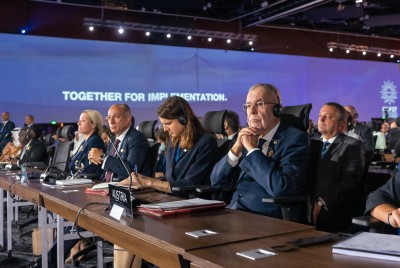Austrian President Van der Bellen at the UN Climate Summit in Egypt
Austria's Federal President Alexander Van der Bellen is going into the COP27 world climate conference with mixed feelings. Given the insufficient or inadequately implemented results of previous climate summits, optimism is "not easy - but necessary," said Alexander Van der Bellen at the conference venue in Sharm El-Sheikh, Egypt.
 Even though President Van der Bellen is an advocate for combating climate change, his personal expectations for the summit are pragmatic. / Picture: © Österreichische Präsidentschaftskanzlei / Peter Lechner/HBF
Even though President Van der Bellen is an advocate for combating climate change, his personal expectations for the summit are pragmatic. / Picture: © Österreichische Präsidentschaftskanzlei / Peter Lechner/HBF
"Where else are such negotiations going to take place? The UN is the only global platform we have," President Van der Bellen said ahead of the COP27 world climate conference.
This represents, as reported by Vindobona.org, his first trip abroad after his re-election. Van der Bellen stated that "if it had come to a runoff, I would not be sitting here today." Van der Bellen will speak about tackling the climate crisis as part of a meeting of heads of state and government, and will also hold several bilateral talks on the sidelines of the summit - including, most notably, with UN Secretary-General Antonio Guterres.
It is also Guterres to whom Alexander Van der Bellen pays great respect for his commitment to the fight for action against climate change: "It is a historic stroke of luck that Guterres, who does not come from a Green Party, has been reappointed as UN Secretary-General." The Portuguese social democrat is "now the most fiercely committed campaigner against the climate emergency that anyone could wish for."
My dear friend, @antioguterres. Thank you for your powerful and inspiring leadership in the fight against the #ClimateCrisis. Together, we must do everything we can to ensure a liveable future on this beautiful planet for generations to come. #COP27 (vdb) pic.twitter.com/F4vnmUsIEv
— A. Van der Bellen (@vanderbellen) November 7, 2022
As for the UN Secretary-General, it is also clear to President Van der Bellen that the goal of the 2015 Paris climate treaty to limit warming to 1.5 degrees by the end of the century, if possible, "cannot be achieved with the current measures, but rather we will end up with 2.5 to 4 degrees."
Heat waves, droughts and floods have affected millions of people and cost billions this year. According to ORF, by mid-year, up to 19.3 million people were affected by food insecurity or inadequate access to food due to extremely prolonged droughts in eastern Africa, among other things. Floods in Pakistan claimed the lives of at least 1,700 people and displaced nearly eight million from their homes.
According to climate experts, global warming must be stopped at 1.5 degrees to avoid crossing dangerous tipping points and avert the most catastrophic consequences of climate change, as ORF reported. The international community has agreed on this goal. However, it seems unlikely that it can be achieved due to a lack of action.
Alexander Van der Bellen is clear about how difficult it is to convey this theme in light of an October just experienced, which was generally perceived as a pleasant extension of late summer - with temperatures around ten degrees above the long-term average for October. "What if the same thing happens in March, April, and July, with no rain? What happens to agriculture, to nature in general?" The point, he said, is to convey "that it doesn't matter, but that every tenth of a degree, not just somewhere in Africa, but especially here in the Alps matters a lot, where heating is going on about twice as fast as in the rest of the world."
In addition, the melting of glaciers has picked up enormously this year. In the Alps, average losses of three to four meters of ice thickness were measured, according to ORF, significantly more than in the previous record year of 2003. The Greenland ice sheet melted for the 26th year in a row, and in addition, rain instead of snow fell for the first time at the highest point of the ice sheet in August 2021, according to ORF. In Switzerland, the volume of glaciers decreased by more than a third over the past twenty years. For an Alpine country like Austria, these figures are threatening.
In this context, the Federal President will also meet a delegation of Austrian young people in Sharm El-Sheikh: "Young people have contributed significantly to increase sensitivity and attention to the issue, starting with Greta Thunberg - but not only."
His expectations for the summit are pragmatic: "At any rate, what is being tried is to make progress in the area of financing and in the area of responsibility for what has already happened and - even if the one-and-a-half-degree target is reached - will still happen." Here, President Van der Bellen expects "tough disputes, ultimately about money issues, but also morality and responsibility. The industrialized countries are reluctant to accept this responsibility, and the global South - rightly so - never tires of pointing this out. Whereby not everything that happens in the global South will be attributable to the behavior of the industrialized countries."
For years, developing countries and small island states have been pointing out that they are already feeling the effects of global warming significantly and more strongly than the rich industrialized nations. They are therefore calling for additional financial aid from the industrialized countries in this area.
In the almost 30 years of UN climate negotiations, however, no financing mechanism for this has yet been decided. Now, according to ORF, the conference plenary agreed to include financial aid for poorer countries to cope with climate-related damage and losses already occurring as a separate item on the negotiating agenda for the first time at COP27.



